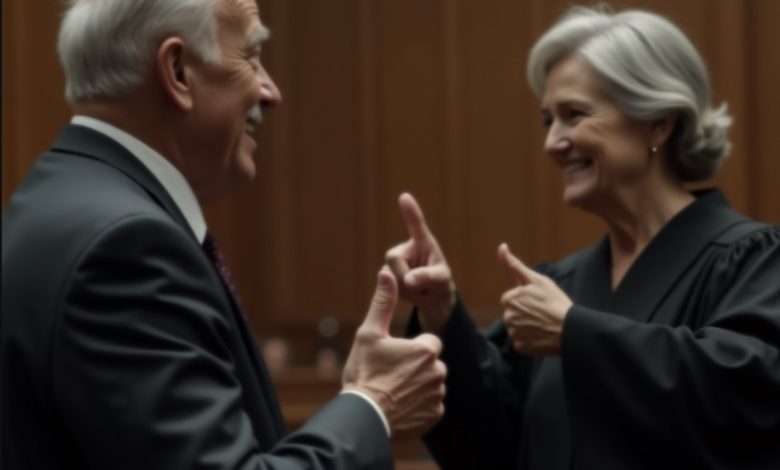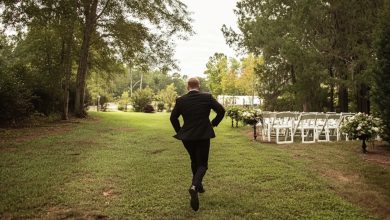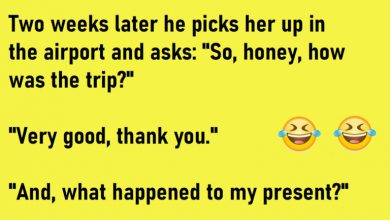“The Judge Asked Me One Question, and My Answer Changed the Whole Case”

My son-in-law sued my daughter, asking for a divorce and demanding every asset they owned. When the judge turned to me and asked if I had any proof, I answered only:
“No, ma’am.”
The courtroom fell quiet. The judge looked straight at me, and in that look she understood everything.
Emily sat across from me in my sunlit kitchen a few days earlier, but there was no light in her eyes. She had lost weight. Her shoulders sagged under a sorrow that had hollowed her out. “He wants it all, Dad,” she said in a voice that was thin from crying. She pushed a heavy legal folder toward me. “Read this. His lawyer says they can show I’m an unfit mother because I started therapy after Mom died. They’ll say I waste money because I booked business-class flights to come see you. They’ll twist anything.”
I opened the binder and skimmed the pages. Every sheet felt like a deliberate cut aimed at making my child pay, both in money and in shame. Julian — my daughter’s husband, the man I had never trusted — was finally showing who he really was. I felt a cold regret settle in me. I had noticed signs long ago: the ready smile that didn’t reach his eyes, the way he paid more attention to who my daughter could introduce him to than to her. But love is a tricky thing. Because Emily loved him, I let my wish for her happiness override my common sense. I let the father in me put aside the man who used to move in dangerous places. That was a mistake — one my daughter was now paying for.
A familiar, hard anger wound up inside me. It was a feeling I had not let out for years — a sharp focus I had learned in work that asked men to be steady when the ground moved. I laid my hand on Emily’s and spoke softly, steady as I could make it. “Emily, breathe. Don’t speak to Julian. Follow your lawyer’s orders exactly, no more and no less. Do you trust me to handle this?”
She looked at me. For the first time that day, a small spark of hope touched her wet eyes. “Yes, Dad. I trust you.”
“Good. Go home. Hold Noah close. I’ll take care of the rest.”
After she left, the house grew very quiet. I was not Arthur Vance, the retired cultural attaché who gave lectures and wrote polite notes for embassies. For one night, I let that man sleep. I became someone else. I locked my study, sat at a plain laptop that was not linked to our home network, and logged into a secure grid. Then I sent three short messages to three people in a contact group labelled “Book Club.”
First message: “Full financial sweep on Julian Croft. Priority: overseas transfers.”
Second message: “Map social and business links. Find weak spots.”
Third message, to an old friend in Langley: “Alex — pull a name run on Julian Croft. Off-the-books. Urgent.”
I closed the laptop. I had no plan to let this play out inside Julian’s safe little courtroom. I planned to shake the floor out from beneath him long before he knew it was moving.
Julian had the old narcissist’s blind spot: he assumed he was the cleverest man in any room. He believed he had married into a name and a doorway. He looked at me and saw a harmless retired scholar who liked poems and quiet dinner parties. He never dug into a gap in my public record, the twenty years that read like “cultural attaché” entries in Vienna, Istanbul, Geneva. He did not know that a lot can hide behind a polite title.
Forty-eight hours after I sent those messages, pieces began arriving. Bank numbers in the Cayman Islands. A chain of shell companies registered in Panama and elsewhere. Old invoices that tracked money moving into luxury real estate projects. Then, at three in the morning, an encrypted note flashed on my screen. It was Alex.
Alex: Artie — you sure you want to pull this thread? It goes into some very dark places.
Me: My daughter’s life is being strangled. Pull it.
Alex: OK. Look up Sergei Volkov. Be careful.
I typed the name into a secure watchlist. It all snapped into focus. Sergei Volkov was not some minor businessman. He was a sanctioned oligarch from Russia, very close to the center of power. The transaction maps showed Julian acting as a middleman — hundreds of millions flowing from sanctioned entities into projects with Julian’s mark on them. He was not simply greedy. He was part of a network moving tainted money through our country.
I felt a twist in my gut. This stopped being a private fight. What had been my family problem was suddenly a national security issue. Julian was more than a liar; he was a conduit for dirty money that might harm our nation’s safety. That changed everything.
But it brought a terrible problem. I had evidence that could ruin him for good. I had proof that might send him away for decades. But the way I had obtained it — through old contacts and off-the-books channels I had used for years — made it unusable in a public courtroom. If I waved this data in front of a judge, I would also wave my network out into the light. People would get hurt. Colleagues who had trusted me with their lives could be exposed. I had a weapon I could not fire.
I felt trapped. There was only one person who might understand the bind I was in. Only one person who I could send the right message to and know she would read between the lines.
The next morning I pulled the divorce docket. The assigned judge was Evelyn Reed.
Evie.
We had not seen each other in fifteen years, but some bonds run deep and do not break with time. Evie had once been my analyst in a dangerous place; she had been the mind to my motion. We had shared cramped safe houses, shared food and fear and moments that taught two people to trust silence as a language. She understood how intelligence worked, how evidence could be useful or deadly. She knew how to read a thin line between truth and danger.
The court was the trap. It was the only place I could send a message in plain sight and hope someone older, trained, and patient would catch it.
The night before the hearing, I compiled everything I had into a sealed, encrypted packet. Offshore account numbers. Transaction trails that ran through three continents. Photographs of Julian meeting with agents who should never have been part of his life. I sent the packet to a reputable investigative reporter with instructions: if Evie does not act or the signal fails, release the full file in twenty-four hours. It was a dead-man switch. If my back-up was needed, the story would go public.
Courtrooms are cold. They try to be fair on paper, but they can be brutal in practice. Julian’s lawyer, Marcus Thorne — a fast, sharp man with pinstripes and a smile like a trap — worked the room hard. He pulled at credit card statements, framed travel as irresponsible spending, framed Emily’s therapy as unstable behavior. He painted a picture meant to make a judge think a mother could not care for her child.
The cross-examination was vicious. Emily’s voice shook. Her lawyer fought, but he was fighting smoke. The last phrase of one of Julian’s long attacks landed like a blow. The judge turned toward me and asked, calm but firm, “Mr. Vance, your daughter says you have information about Mr. Croft’s finances. Do you have anything you can share with this court?”
This was the moment I had been preparing quietly for. I stood and looked at the one face I most wanted to see: Evie’s. For a half-second the noisy courtroom went away. We were back in a tiny safe house on an embassy roof, whispering plans and trading signals. Years of shorthand flashed between us.
I answered with two simple, loaded words: “No, ma’am.”
Confused looks spread around the room. Julian’s lawyer smirked. Emily’s hands went still. Julian smiled in the way predators smile.
But Evie’s face did not change the way it did for others. I saw in her the look I had seen dozens of times in other lives — the look of someone who understood a signal. Her eyes did not read my words as a denial of knowledge. She read them as a code. She saw that I could not produce evidence in court and that doing so would be worse than useless. She understood that the threat was real and that it needed a different kind of response.
She rose slowly. “This court will take a recess,” she said, her voice firm and controlled. “I will review the preliminary documents and will reconvene tomorrow.”
It was not a dismissal. It was a pause. It was exactly what I had needed.
In the hours that followed, Evie put in the calls her title did not allow her to make openly. A friend at the Department of Justice got a quietly worded tip. The reporter I had warned received the signal and prepared to release the story unless officials acted. By the time the sun climbed the next day, the Treasury and a federal team were moving. They had enough to get search warrants and to freeze accounts tied to Julian’s projects. Agents were at his office before midday. His phone rang. Men with badges arrived with papers. He was taken into custody on money-laundering and related federal charges. The divorce hearing, which had been his bid to take everything, collapsed under the weight of criminal law.
Within days, everything Julian had planned to seize was suddenly off limits to him. The house, the accounts, a large share of their joint holdings were protected for Emily. The federal seizure did the work the family court could not have done in the same time.
A few months later I sat with Evie in a small Georgetown café. She had retired quietly after those events. The war of quiet operations was over. We sipped coffee and let the sun warm our hands.
“You took a tremendous risk, Arthur,” she said, stirring her tea.
“It had to be done,” I answered. “It was the only way to protect Emily and Noah without exposing people who would be hurt by a public fight.”
She smiled a little. “We learned to read silences together. You made the right call. He thought he was clever, playing a courtroom game. He didn’t see the board we were using.”
The best part of the end was not Julian’s fall. It was that my daughter and her little boy were safe. Emily got a divorce, custody, and the peace she needed to heal. She and Noah moved into a bright small house. She started to sleep through the night more often, to laugh at a small joke, to plan simple days. The scars were still there, but the life she deserved was back within reach.
On a clear afternoon, watching Emily push Noah on the swing in a park, I felt something settle in me. I had not done this for pride. I had done it because fathers are small things until the right moment, when they can become whatever their children need them to be. I had used the skills I had kept hidden for years to fix what had been broken in our family. In the end, the victory was quiet: a child who could keep a bedtime without fear, a woman who could go to therapy without shame, and a father who could look at them and know he had done the right thing.










